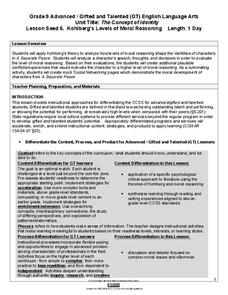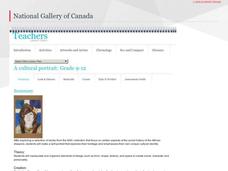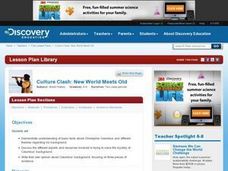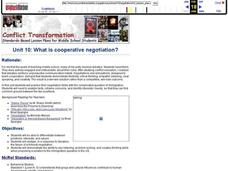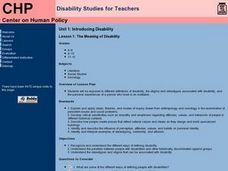Maryland Department of Education
The Concept of Identity Lesson 6: Kohlberg's Levels of Moral Reasoning
How does our moral reasoning shape our identity? After a study of Kohlberg's Levels of Moral Reasoning, readers use Kohlberg's theories to analyze the speech, thoughts, and decisions of a character in A Separate Peace. They then...
Curated OER
The Emerging American Identity
Students define what it meant to be an American early on in the nation's history. In this American identity lesson, students examine the noted quotations and determine what was meant by each of the authors with regards to an American...
Curated OER
Chapter 8: Deviance and Social Control
For this deviance and social control worksheet, learners respond to 14 fill in the blank questions and 15 matching questions pertaining to crime and how societies attempt to control it.
Curated OER
Know Thyself: Reflections of the Adolescent Identity Crisis in Rock and Roll
Twelfth graders define themselves through music. In this psychology lesson, 12th graders identify James Marcia's 4 states of identity and identify songs that reflect each of the states.
National Gallery of Canada
A Cultural Portrait
Explore heritage and identity through an examination of art and a related project. The featured art, related to the African diaspora, includes several types of art created by different artists. Pupils consider their own backgrounds and...
Curated OER
Human Development
Students brainstorm about the physical, emotional, and social developmental milestones of human beings. They complete a timeline as a class that begins with birth and ends with death. Students identify whether each milestone is...
Curated OER
Post-Modernism and Mass Culture
Students examine the suggestion that the subjective experience of everyday life and sense of identity has changed in America in recent years. In this post-modernism and mass culture lesson, students engage in 4 multi-step exercises that...
Curated OER
In-Group Favoritism
Students discover how to cross social boundaries. In this character education lesson, students discuss the positive and negative impacts of favortism they witness in their local community as well as the international community....
Curated OER
New World Meets Old
Students demonstrate understanding of basic facts about Christopher Columbus and different theories regarding his background. They try to solve the mystery of Christopher Columbus' background and write an essay offering their own opinion.
Foreign Policy Research Institute
The Mind of a Terrorist: A Psychosocial Perspective
What a great way to make a psychology lesson on personality development socio-politically relevant! Class members investigate causes of radicalism--specifically, becoming a terrorist. This resource includes background information, key...
Curated OER
Revolution! Freedom for All?
Twelfth graders examine the causes of freedom by revolutionary patriots. In this Civics and Economics lesson, 12th graders analyze primary sources. Students work cooperatively to write a freedom declaration for their group.
Curated OER
In the Future we will all be Mixed Bloods and Mestizoes
Students examine the concept of origin and ethnicity. In this ethnic studies lesson, students engage in a variety of interdisciplinary activities including posters, and discussions to better understand our past and future.
Curated OER
Faces of Courage: Teenagers Who Resisted
Students read true stories of teenagers who defied Hitler and avoided participation in the Hitler Youth. They discuss the stories paying attention to the dangers and incredible peer pressure that these children faced. They consider how...
Curated OER
School Redesign and Multiple Intelligences
Students examine their own intelligence to find areas of strength after studying the multiple intelligences. For this diverse learning styles lesson, students analyze how the school environment fosters or fails students of diverse...
Curated OER
Culture Clash: New World Meets Old
Sixth graders explore the history of Christopher Columbus. In this World History lesson, 6th graders research facts about Christopher Columbus. Students write their own opinion about Columbus's background focusing on three...
Curated OER
What is cooperative negotiation?
Tenth graders differentiate between positions, interests, and values. For this current events lesson, 10th graders analyze, in a response to literature, the failure of a fictional negotiation. Students demonstrate the ability...
Curated OER
Nazism
Tenth graders explore the acts of the Nazi party and discuss how people can commit atrocities against humanity. They discuss the aspects of the Aryan race that the Nazis identified with and how they led them to think they should purify...
National Gallery of Canada
Who Are You?
What can a self-portrait reveal about an artist? Discuss various self-portraits before tasking your pupils with creating their own. Learners research artists, develop an idea of their own individuality, and create photo collages with...
National Gallery of Canada
Make a Parfleche
Examine American Indian art and culture by observing contemporary art and creating original pieces. Class members discuss artwork included in the plan and use these images to help inspire their own work, which should represent...
National Gallery of Canada
Morphosis
Experience anthropomorphism and metamorphosis in action with flipbooks! Instead of giving human characteristics to animals, though, pupils will show a transformation from human to animal or vise versa through their drawings. The...
Curated OER
Parenting Readiness
Students identify parenting styles, including positive guidance techniques that help children develop positive self-concepts, self-management, and responsibility. They emphasize the differences between and the importance of motherhood...
Curated OER
Stages of Life
Students investigate the eight stages of human development. For this stages of life lesson students discuss as a class the stages and complete an activity.
Curated OER
The Meaning of Disability
Students discover the different types of disabilities. They examine the stereotypes and stigmas associated with them and hear from a person who lived in an institution.
